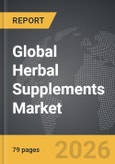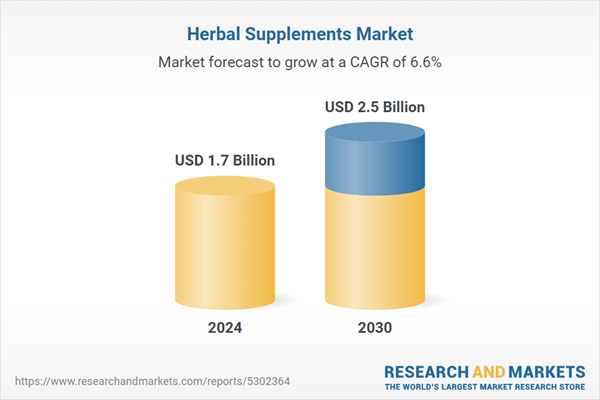Global Herbal Supplements Market - Key Trends & Growth Drivers Summarized
Why Are Herbal Supplements Essential for Modern Health and Wellness?
Herbal supplements have become a vital part of contemporary health and wellness practices, offering consumers natural alternatives to conventional medications and dietary aids. But what exactly makes herbal supplements so crucial in today’s wellness landscape? Herbal supplements are products derived from plants and are used to support health and well-being. They can include a variety of forms, such as capsules, powders, teas, and tinctures, targeting specific health concerns like immunity, digestion, and stress relief. As consumers increasingly seek holistic and natural solutions for their health needs, the demand for herbal supplements continues to rise.The surge in demand for herbal supplements can be attributed to growing consumer awareness regarding the potential side effects of pharmaceutical drugs and a general shift toward preventive health care. With a rising interest in self-care and natural remedies, many individuals are turning to herbal supplements as a means to enhance their health, manage symptoms, and support overall wellness. This trend is fueled by social media, wellness influencers, and a growing body of research highlighting the benefits of specific herbs, leading to increased consumer confidence in herbal products.
How Are Technological Advancements Elevating the Quality of Herbal Supplements?
The herbal supplements market has witnessed significant technological advancements that have improved product formulation, quality, and efficacy. But what are the key innovations driving these developments? One of the most impactful advancements is the use of advanced extraction and processing techniques that enhance the potency and bioavailability of herbal ingredients. Technologies such as supercritical CO2 extraction and cold-press extraction allow manufacturers to retain the beneficial properties of herbs while removing harmful substances and impurities. This focus on quality ensures that herbal supplements deliver effective results, appealing to discerning consumers.Another critical innovation is the integration of quality control measures and standardization processes in the production of herbal supplements. Manufacturers are increasingly adopting rigorous testing protocols to ensure the purity, potency, and safety of their products. This includes the use of advanced analytical techniques, such as high-performance liquid chromatography (HPLC) and mass spectrometry, to verify the identity and concentration of active ingredients. As consumers become more aware of the importance of product safety and efficacy, the demand for high-quality herbal supplements that meet strict quality standards is expected to grow.
The growing emphasis on sustainability and eco-friendly practices in the production of herbal supplements is also shaping the market. Many brands are now sourcing herbs from sustainable farms and using environmentally friendly packaging materials. This commitment to sustainability resonates with environmentally conscious consumers, driving demand for herbal supplements that prioritize ethical sourcing and environmental responsibility. As the health and wellness industry increasingly addresses environmental concerns, the integration of sustainable practices will be critical for the growth of the herbal supplements market.
What Market Trends Are Driving the Adoption of Herbal Supplements Across Various Sectors?
Several key market trends are shaping the adoption of herbal supplements across various sectors, reflecting the evolving needs of consumers and advancements in product offerings. One of the most prominent trends is the increasing demand for natural and organic products. As consumers become more health-conscious and aware of the ingredients in their supplements, they actively seek out herbal options that are free from artificial additives and fillers. This trend has led to a rise in the popularity of certified organic herbal supplements, as consumers prioritize products that align with their values of health and sustainability.Another key trend driving the adoption of herbal supplements is the growing focus on personalized health and wellness. Consumers are increasingly looking for tailored solutions that address their specific health concerns, leading to a demand for customizable herbal supplement formulations. Brands that offer personalized blends or allow consumers to choose specific herbs based on their individual health needs are gaining traction in the market. This trend toward personalization encourages innovation and development in the herbal supplements sector, as companies seek to cater to diverse consumer preferences.
The rise of e-commerce and online shopping is also influencing the adoption of herbal supplements. The convenience of online shopping allows consumers to access a broader range of brands and products, read reviews, and compare ingredients easily. This shift in shopping behavior is driving growth in the market, as consumers seek out niche and artisanal herbal supplement brands that align with their health goals. The digital landscape enables brands to reach a wider audience and promote their unique offerings, further driving interest in herbal supplements.
What Factors Are Driving the Growth of the Global Herbal Supplements Market?
The growth in the global herbal supplements market is driven by several factors, including the increasing demand for natural health solutions, advancements in product formulations, and the rising focus on health and wellness. One of the primary growth drivers is the rapid expansion of the health and wellness industry, where more individuals are seeking effective and natural solutions to support their overall well-being. As consumers become more engaged in preventive health practices, the demand for high-quality herbal supplements that enhance health and manage specific conditions is expected to rise.Another key growth driver is the ongoing advancement of technology that enhances the formulation and quality of herbal supplements. Innovations in extraction methods, quality control, and sustainable ingredient sourcing are enabling manufacturers to create effective products that meet consumer expectations. As organizations seek to leverage these advancements to improve their product offerings and meet market demands, the demand for innovative herbal supplements is anticipated to grow. Additionally, the increasing availability of affordable herbal options is making these products more accessible to a broader range of consumers.
The global herbal supplements market is also benefiting from the rising emphasis on regulatory compliance and quality standards in the health and wellness industry. As consumers prioritize quality and safety in their dietary choices, the demand for herbal supplements that meet high manufacturing standards is increasing. Manufacturers are investing in research and development to ensure that their products comply with industry regulations and provide reliable results, driving growth in the market.
With ongoing advancements in product formulations, the increasing demand for natural health solutions, and the rising focus on health and wellness, the global herbal supplements market is poised for sustained growth. The dynamic interplay of technological innovation, market demand, and evolving consumer preferences is set to shape the future of the market, offering businesses new opportunities to enhance their product offerings, optimize performance, and drive revenue growth. As companies continue to prioritize effective herbal supplements as part of their overall health strategies, these products will remain essential tools for achieving success in the competitive wellness landscape.
SCOPE OF STUDY:
The report analyzes the Herbal Supplements market in terms of units by the following Segments, and Geographic Regions/Countries:- Segments: Source (Echinacea, Flaxseeds, Turmeric, Ginger, Ginseng, Other Sources); Form (Tablets & Capsules, Liquid & Soft Gels, Powder & Granules); Consumer Type (Adults, Pregnant Women, Geriatric, Pediatric)
- Geographic Regions/Countries: World; United States; Canada; Japan; China; Europe (France; Germany; Italy; United Kingdom; Spain; Russia; and Rest of Europe); Asia-Pacific (Australia; India; South Korea; and Rest of Asia-Pacific); Latin America (Argentina; Brazil; Mexico; and Rest of Latin America); Middle East (Iran; Israel; Saudi Arabia; United Arab Emirates; and Rest of Middle East); and Africa.
Key Insights:
- Market Growth: Understand the significant growth trajectory of the Echinacea segment, which is expected to reach US$899.7 Million by 2030 with a CAGR of a 7.0%. The Flaxseeds segment is also set to grow at 6.9% CAGR over the analysis period.
- Regional Analysis: Gain insights into the U.S. market, valued at $434.5 Million in 2024, and China, forecasted to grow at an impressive 10.1% CAGR to reach $588.2 Million by 2030. Discover growth trends in other key regions, including Japan, Canada, Germany, and the Asia-Pacific.
Why You Should Buy This Report:
- Detailed Market Analysis: Access a thorough analysis of the Global Herbal Supplements Market, covering all major geographic regions and market segments.
- Competitive Insights: Get an overview of the competitive landscape, including the market presence of major players across different geographies.
- Future Trends and Drivers: Understand the key trends and drivers shaping the future of the Global Herbal Supplements Market.
- Actionable Insights: Benefit from actionable insights that can help you identify new revenue opportunities and make strategic business decisions.
Key Questions Answered:
- How is the Global Herbal Supplements Market expected to evolve by 2030?
- What are the main drivers and restraints affecting the market?
- Which market segments will grow the most over the forecast period?
- How will market shares for different regions and segments change by 2030?
- Who are the leading players in the market, and what are their prospects?
Report Features:
- Comprehensive Market Data: Independent analysis of annual sales and market forecasts in US$ Million from 2024 to 2030.
- In-Depth Regional Analysis: Detailed insights into key markets, including the U.S., China, Japan, Canada, Europe, Asia-Pacific, Latin America, Middle East, and Africa.
- Company Profiles: Coverage of players such as Ancient GreenFields Pvt. Ltd., Archer Daniels Midland Company, Arizona Natural Products, Bio-Botanica Inc., Blackmores and more.
- Complimentary Updates: Receive free report updates for one year to keep you informed of the latest market developments.
Some of the 13 companies featured in this Herbal Supplements market report include:
- Ancient GreenFields Pvt. Ltd.
- Archer Daniels Midland Company
- Arizona Natural Products
- Bio-Botanica Inc.
- Blackmores
- Gaia Herbs
- Glanbia plc
- Herbalife International of America, Inc.
- Jarrow Formulas, Inc.
- NaturaLife Asia Co., Ltd.
- Nature’s Bounty
- NBTY, Inc.
- Now Foods
- Nutraceutical International Corporation
- Ricola
- Solgar, Inc.
This edition integrates the latest global trade and economic shifts as of June 2025 into comprehensive market analysis. Key updates include:
- Tariff and Trade Impact: Insights into global tariff negotiations across 180+ countries, with analysis of supply chain turbulence, sourcing disruptions, and geographic realignment. Special focus on 2025 as a pivotal year for trade tensions, including updated perspectives on the Trump-era tariffs.
- Adjusted Forecasts and Analytics: Revised global and regional market forecasts through 2030, incorporating tariff effects, economic uncertainty, and structural changes in globalization. Includes segmentation by product, technology, type, material, distribution channel, application, and end-use, with historical analysis since 2015.
- Strategic Market Dynamics: Evaluation of revised market prospects, regional outlooks, and key economic indicators such as population and urbanization trends.
- Innovation & Technology Trends: Latest developments in product and process innovation, emerging technologies, and key industry drivers shaping the competitive landscape.
- Competitive Intelligence: Updated global market share estimates for 2025, competitive positioning of major players (Strong/Active/Niche/Trivial), and refined focus on leading global brands and core players.
- Expert Insight & Commentary: Strategic analysis from economists, trade experts, and domain specialists to contextualize market shifts and identify emerging opportunities.
- Complimentary Update: Buyers receive a free July 2025 update with finalized tariff impacts, new trade agreement effects, revised projections, and expanded country-level coverage.
Table of Contents
Companies Mentioned (Partial List)
A selection of companies mentioned in this report includes, but is not limited to:
- Ancient GreenFields Pvt. Ltd.
- Archer Daniels Midland Company
- Arizona Natural Products
- Bio-Botanica Inc.
- Blackmores
- Gaia Herbs
- Glanbia plc
- Herbalife International of America, Inc.
- Jarrow Formulas, Inc.
- NaturaLife Asia Co., Ltd.
- Nature’s Bounty
- NBTY, Inc.
- Now Foods
- Nutraceutical International Corporation
- Ricola
- Solgar, Inc.
Table Information
| Report Attribute | Details |
|---|---|
| No. of Pages | 79 |
| Published | February 2026 |
| Forecast Period | 2024 - 2030 |
| Estimated Market Value ( USD | $ 1.7 Billion |
| Forecasted Market Value ( USD | $ 2.5 Billion |
| Compound Annual Growth Rate | 6.6% |
| Regions Covered | Global |









